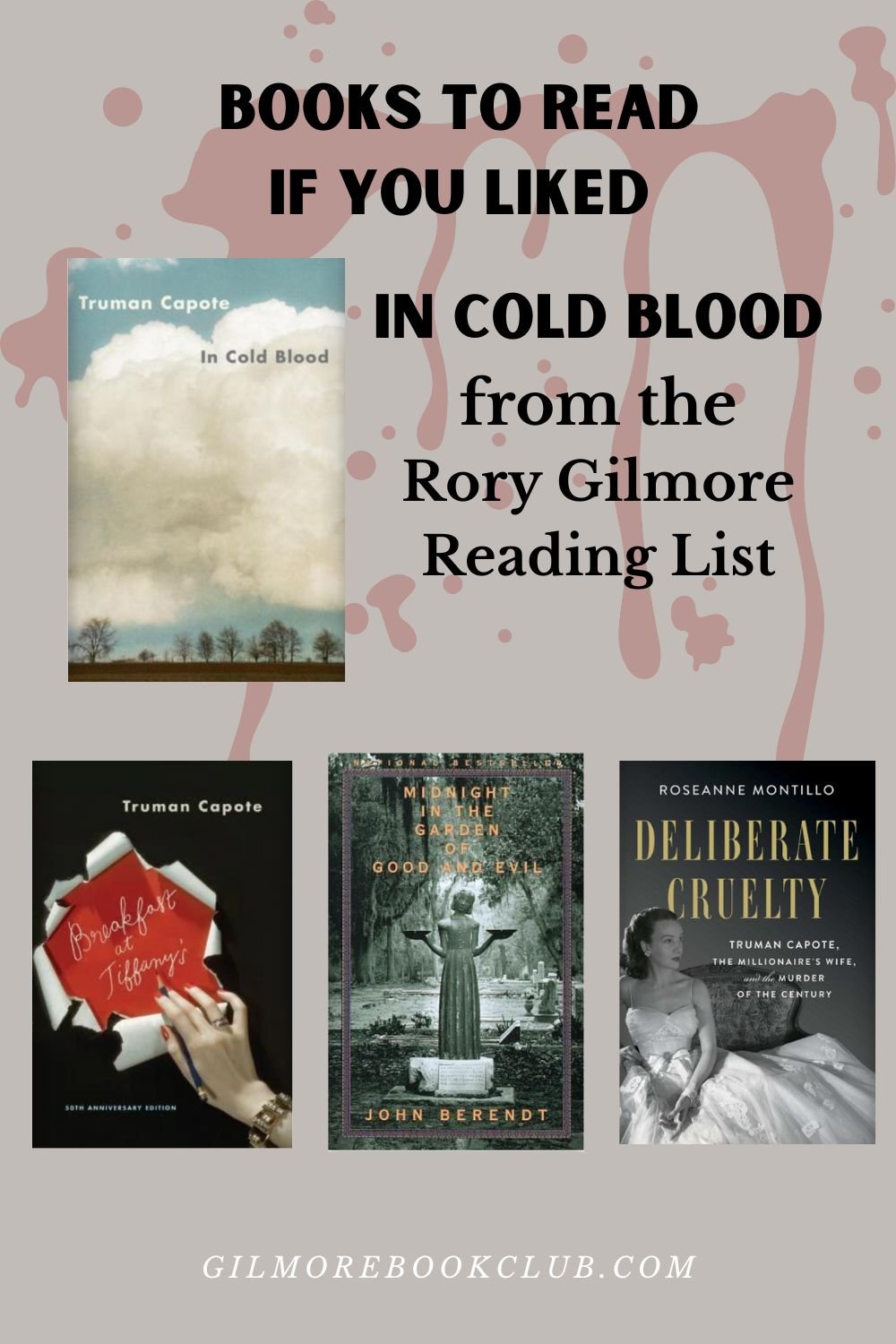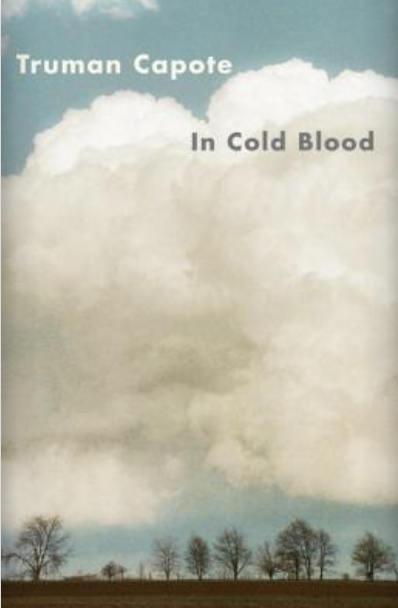read What scares you
In Cold Blood by Truman Capote
How to learn from the things and books that scare you
Pin this to save this post for later!
Let me start by saying if there was ever a book that scared me so much I had to put it in the freezer, it would be In Cold Blood by Truman Capote. For those of you that aren’t Friends fans, I’ll explain the freezer reference. There’s one episode where Rachel finds a copy of The Shining in Joey's freezer. When questioned about it, Joey admits that even though he loves the book, he feels safer if he puts in the freezer when things get too scary. They start a conversation about their favorite books and to try and convince the other that their book is better, they decide to make a switch. Joey will read Rachel's favorite, Little Women, and Rachel will read Joey’s favorite, The Shinning. However, they end up in a spoiler fight and when the fate of a beloved Little Women character is revealed, Joey is devastated, and only one thing makes him feel better: putting the book in the freezer.
So, there you have it, when a book becomes too much for you, just put it in the freezer. If only that was the solution to more things in life.
But here is my question: do you take it back out of the freezer and keep reading it? And how do you know when you’re ready to do that? Joey clearly states that he rereads The Shining, but does he ever go back to Little Women? How do you go on when something freaks you out so much that your response is to shut that thing away in a box full of ice?
Truman Capote’s In Cold Blood recounts the true story of the Clutter family murder. The Clutters, father Herb, his wife Bonnie, daughter Nancy, and son Kenyon were beloved and respected members of the city of Holcomb, Kansas. All four were brutally murdered on the night of November 15,1959. Capote details the family’s actions prior to that deadly night, the bloody, harrowing details of how the bodies were slaughtered and later found, and how the authorities tracked and finally apprehended the murderers.
Why do we do the things that scare us? If you’re in a life and death situation and you’re scared to face it, doing something, anything despite your fear makes sense because the other option is giving up and just letting that bad thing steamroll over you. So that means that the real focus of this is doing something that scares you that will have no life-threatening results if you don’t do it, a thing that you’re not forced into.
“’You are a man of extreme passion, a hungry man not quite sure where his appetite lies, a deeply frustrated man striving to project his individuality against a backdrop of rigid conformity. You exist I a half-world suspended between two superstructures, one self-expression and the other self-destruction. You are strong, but there is a flaw in your strength, and unless you learn to control it the flaw will prove stronger than your strength than your strength and defeat you.’” ”
Famous people from Eleanor Roosevelt to Ralph Waldo Emerson have lauded the ritual of regularly doing something that scares you. To me, scared seems like a pretty muted term next to a word like ‘terrifying, and I thought this book was terrifying. People also say that the reason you’re not doing better is because you’re scared of success. That phrase had never made sense to me, but I guess that is determined by how much you like your current life and what your idea of success looks like. For me, success is becoming a full-time writer and author, and that doesn’t scare me at all; it excites me. But maybe to get there, I have to do, or in this case read, the things that scare me.
For some, there is a certain kind of enjoyment in being scared. Those kinds of people are the ones who like sky-diving and watch a lot of scary movies. But I prefer to be safe. There are already way too many unknowns out there, and I spend more than enough time worrying about those. I don't need to also watch people be hacked to pieces with a chainsaw in my free time. It's not like I've never read about people dying or being murdered; simply reading the Harry Potter series will expose you to numerous murders and deaths, but in that specific example as well as others, those moments only last a few sentences at most. And the biggest point: they're not real. Yes, they seem very realistic, but the safeguard here is that someone made them up. Someone made up most of those super famous villains and horrific scenarios, as real as they seem, it’s all just a story. And that’s probably what I’ll have to repeat to myself for most of Stephen King’s novels.
But with In Cold Blood, there is no barrier between the atrocities and reality; these murders actually happened. That town, the Clutters, the residents of Holcomb, the killers- they all existed. If I were to Google ‘the Clutter family’, which I did, you’d find article after article of information on the murders, reflections on the event, literary reviews of In Cold Blood, and most chilling of all, black and white photographs of a family and mug shots of the two men that murdered them. All so real, all very well documented.
I knew this wouldn’t be my favorite book just based on the subject matter alone. I figured if Capote had a friend like Harper Lee who’d helped him to research and write this book, surely it wouldn’t be all bad. But I wasn't prepared for how much detail the book goes into and how unbearably familiar the reader becomes with the murderers. Details bad enough to make me get out of bed and double-check the locks on my front door and stay up way past my usual bedtime watching clips of Graham Norton's talk show to help my brain erase the images In Cold Blood had conjured.
Without the Rory Gilmore Reading List, I would have skipped In Cold Blood. I probably would’ve read Capote’s Breakfast at Tiffany’s at some point, even some of his other works or letters to literary BFF Harper Lee, or maybe books about Capote because I hear he was quite the character. But In Cold Blood would have been a hard no. And maybe my career would turn out just the way I imagined, maybe my writing would be exemplary without the trauma of reading about the murder of a nice Kansas family, but at this point it’s hard to say.
But as a writer, it’s also my job to study literature, to look at every word, at every phrase. Since I’m no longer in school, reading books by authors outside my favorite genres is a way to continue my education. By reading, I can study the craft of writing from Capote. In school, we would have picked out the things that worked well, the images that stayed with you as a reader, the passages that really struck you, and in a way, I do all that, but there’s another element that we didn’t discuss: finding your own voice. We never would have discussed what was or wasn’t our style. You can discover your voice by trial and error, but some of it is easily discovered through reading.
“The land is flat, and the views are awesomely extensive; horses, herds of cattle, a white cluster of grain elevators rising as gracefully as Greek temples are visible long before a traveler reaches them.” ”
From my opening paragraph describing my desire to banish this book to the freezer, you can tell that this subject is not what I would consider a part of my personal style, but there are small moments that are. Beautiful moments of elegantly crafted sentences with a simile that carves an image into your brain or personification that allows you to become as intimately familiar with a force of nature as you would be with another person. I’m glad I could find those moments that I identified with, moments where I connected with the writing, moments that took me beyond my fear.
And that’s how I’d want someone to read my writing. I’d want them to pick up my book, even if it wasn’t normally their thing, just for the experience or to see what they could learn. I’d want them to finish the whole thing, to get every little word or sentence an opportunity because maybe what would impact them the most was waiting for them in the final few pages. I’d want them to give me the chance to connect with them, even if it was just for a few small, moments. I know we don’t all read like that; a lot of people DNF or Do Not Finish a book for many reasons and don’t see a reason why they should continue to read a book they don’t like. But even if you don’t like it, I believe there are still reasons you can appreciate it.
How many times have you avoided a book because it scared you, or intimidated you? Several of the Russian novels, Anna Karenina and War And Peace to be exact, have been named as the books people avoid for the subject matter, the confusing names, the tedious language, and the extraordinary amount of pages. Whatever the reason, whatever book you avoid, I hope you read it one day. I hope you see every turn of the page as an opportunity to find that one tiny seed that you connect with. After all, a single seed may not seem important when looking at an enormous tree, but after that seed is replanted, it is everything to the new life it creates.
So here’s to all the books that scare me, all the ones I’m destined not to like based on my personal preferences, and the ones I discover that I don’t like. Here’s to all the books that will continue to hone my craft and teach me the things I didn’t comprehend or even learn at all in school. And here’s to all the books that just might end up in my freezer. At least they’ll be in good company.
Rory Reading Recommendations
If you liked this books, or this blog post, here’s what to read next.
Pin these to save for later!
References:
Capote, Truman. In Cold Blood. Vintage Books, 1993.
Crane, David, et al. “The One Where Monica and Richard Are Just Friends .” Friends, season 3, episode 13, 30 Jan. 1997.
Sherman-Palladino, Amy, and David S Rosenthal. “The Long Morrow.” Gilmore Girls, season 7, episode 1, 26 Sept. 2006.
The Shining by Stephen King
Little Women by Louisa May Alcott
Breakfast at Tiffany’s by Truman Capote
This page may contain affiliate links. For those purchases, the Gilmore Book Club receives a small commission- thanks!
Featured Product:













